Key takeaways:
- Coalition building thrives on shared values, trust, and effective communication, enabling diverse groups to collaborate for a common cause.
- Pro-life advocacy groups play a vital role in supporting individuals and influencing policy changes, highlighting the importance of community and collective efforts.
- Key principles for successful coalitions include adaptability, recognition of each member’s strengths, and establishing a shared vision to foster commitment and motivation.
- Overcoming challenges in coalition building requires creating an atmosphere of respect, celebrating small victories, and ensuring diverse perspectives are valued and heard.
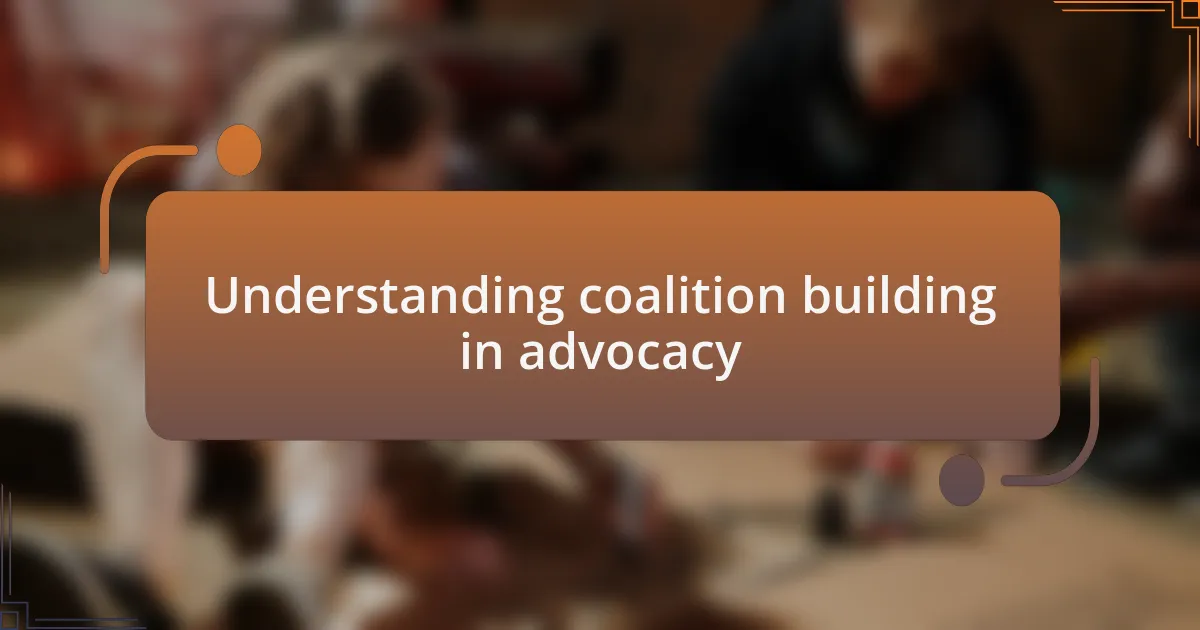
Understanding coalition building in advocacy
Coalition building in advocacy is all about creating partnerships that can amplify voices and efforts. I remember a time when a small group of advocates came together over a common cause; it was remarkable to see how pooling our resources and perspectives led to more impactful outcomes. Have you ever wondered how powerful collaborations can be in changing minds and policies?
Building a coalition isn’t just about numbers; it’s about sharing values and aligning goals. Personally, I’ve seen how trust forms within these alliances, as individuals realize their different strengths complement one another. It’s like finding puzzle pieces that fit together to create a bigger picture—what experiences have you had with teamwork that showcased this synergy?
Understanding the dynamics of coalition building requires empathy and open communication. I recall a discussion where varying opinions initially seemed divisive, but through honest conversations, we found common ground. Isn’t it fascinating how listening can transform tensions into solidarity and ultimately drive meaningful advocacy?
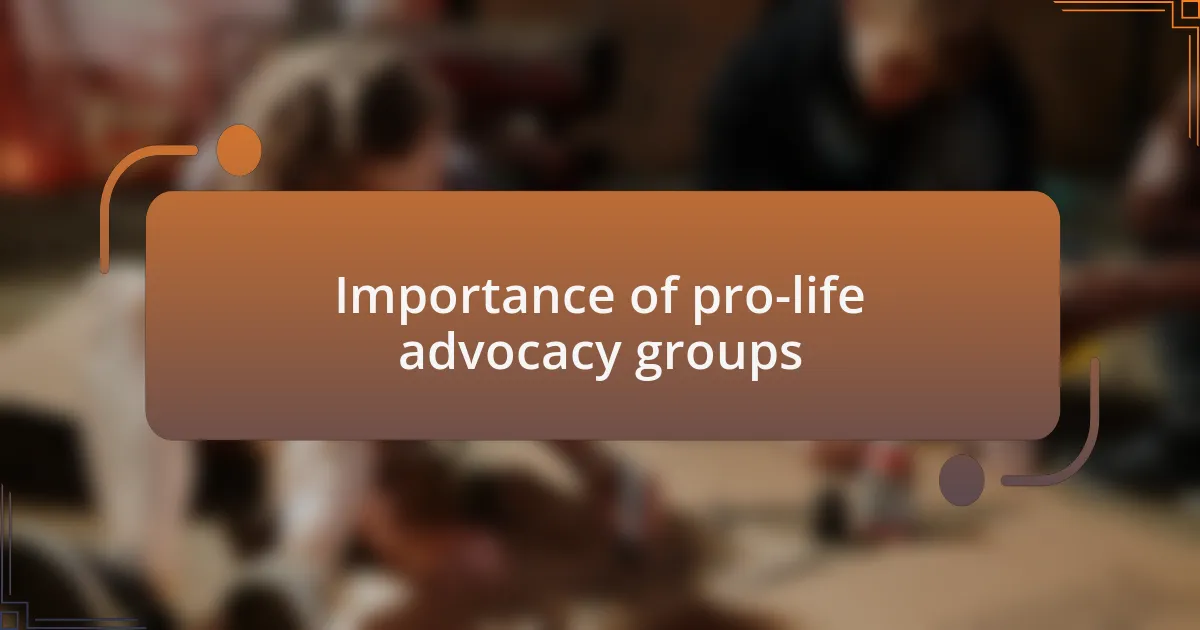
Importance of pro-life advocacy groups
Pro-life advocacy groups play a crucial role in raising awareness and educating the public about life-affirming values. I remember attending a local rally organized by a pro-life group where passionate speakers shared stories about their journeys. That experience opened my eyes to how these gatherings not only inform but also mobilize people to take action—have you ever felt that surge of motivation when surrounded by others who share your convictions?
Furthermore, these groups provide a strong support network for individuals facing difficult decisions regarding pregnancy. I distinctly recall a young woman at a support event who shared how she felt lost and overwhelmed. The presence of empathetic advocates who offered resources and options truly transformed her situation, highlighting how essential these networks are for those in need. Don’t you think that having a community to lean on can make all the difference during life’s challenging moments?
Another significant aspect of pro-life advocacy groups is their ability to influence policy and legislation. I have seen firsthand how coordinated efforts can lead to tangible changes, such as restrictions on late-term abortions. Isn’t it inspiring to think that steps taken by dedicated advocates can shape laws that protect the most vulnerable among us? Ultimately, these groups serve as both a voice for the voiceless and a catalyst for meaningful change in society.
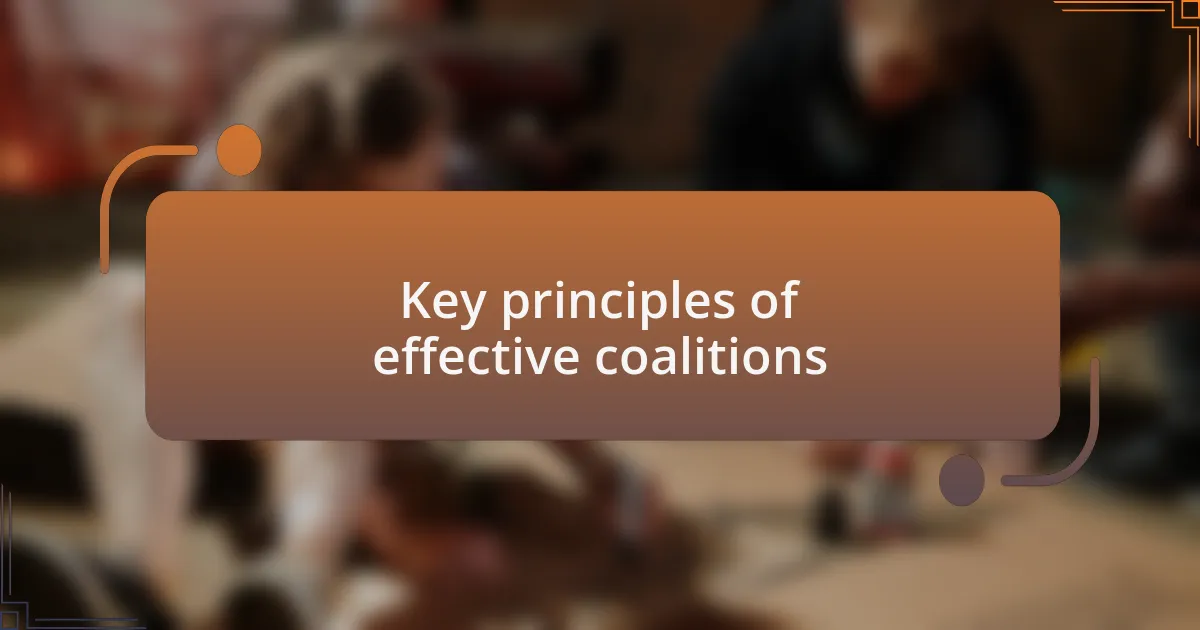
Key principles of effective coalitions
Effective coalitions thrive on shared values and mutual respect among diverse groups. I recall a time when our pro-life coalition brought together various religious organizations, each with unique perspectives but a common mission. By focusing on our shared belief in the sanctity of life, we forged a powerful alliance that transcended our differences—how often do we overlook the strength that comes from collaboration?
Another key principle is clear communication. I’ve been part of coalitions where miscommunication led to frustration and misunderstandings. One particular meeting, we thought we were all on the same page about our next steps, but it turned out differently. It reminded me that open dialogue and regular updates can prevent confusion and keep everyone committed to our shared goals. Isn’t it essential to ensure every voice is heard and valued when striving for a common purpose?
Finally, flexibility and adaptability are crucial traits for any successful coalition. There have been instances when our planned strategies had to change on the fly due to emerging challenges. I remember a campaign that took a surprising turn, but thanks to our team’s willingness to pivot, we managed to turn the situation into an opportunity for deeper engagement with our community. How adaptable is your coalition when faced with unexpected obstacles? Embracing adaptability can truly strengthen our efforts and impact.
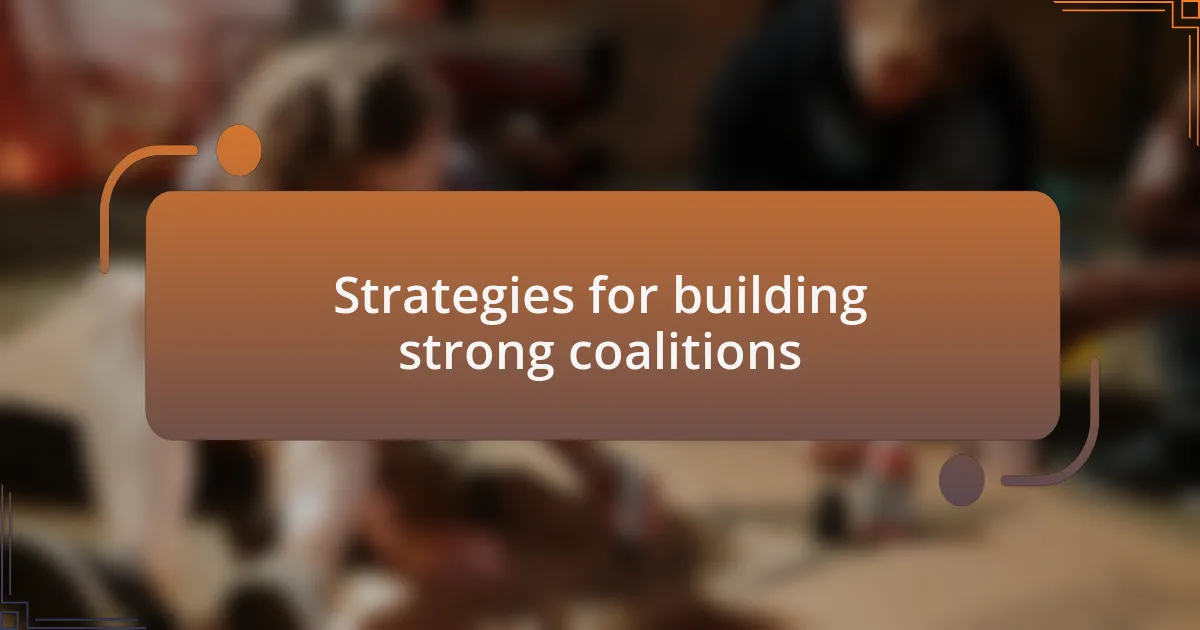
Strategies for building strong coalitions
Developing strong coalitions requires a keen understanding of the unique strengths each member brings to the table. I remember a project where we conducted a strengths inventory among coalition members. This exercise not only illuminated the diverse skills at our disposal but also fostered appreciation and trust among us. Have you ever taken the time to truly recognize what each participant can contribute? This acknowledgment can be a game changer.
Another effective strategy is to establish a shared vision early on. When I’ve been involved in coalitions that deeply connected with a unifying mission, it created a palpable sense of purpose. In one instance, crafting a collective vision statement during our initial meetings inspired enthusiasm and commitment that lasted throughout our campaign. Isn’t it motivating to start with a clear and inspiring goal that everyone can rally around?
Lastly, cultivating relationships beyond the formal meetings is vital. I recall spending time with coalition partners outside of our structured gatherings, whether through casual coffee chats or community events. These informal interactions often sparked innovative ideas and strengthened our bonds. How often do you intentionally invest time in building those personal connections? The friendships formed can be invaluable when challenges arise and trust is paramount.
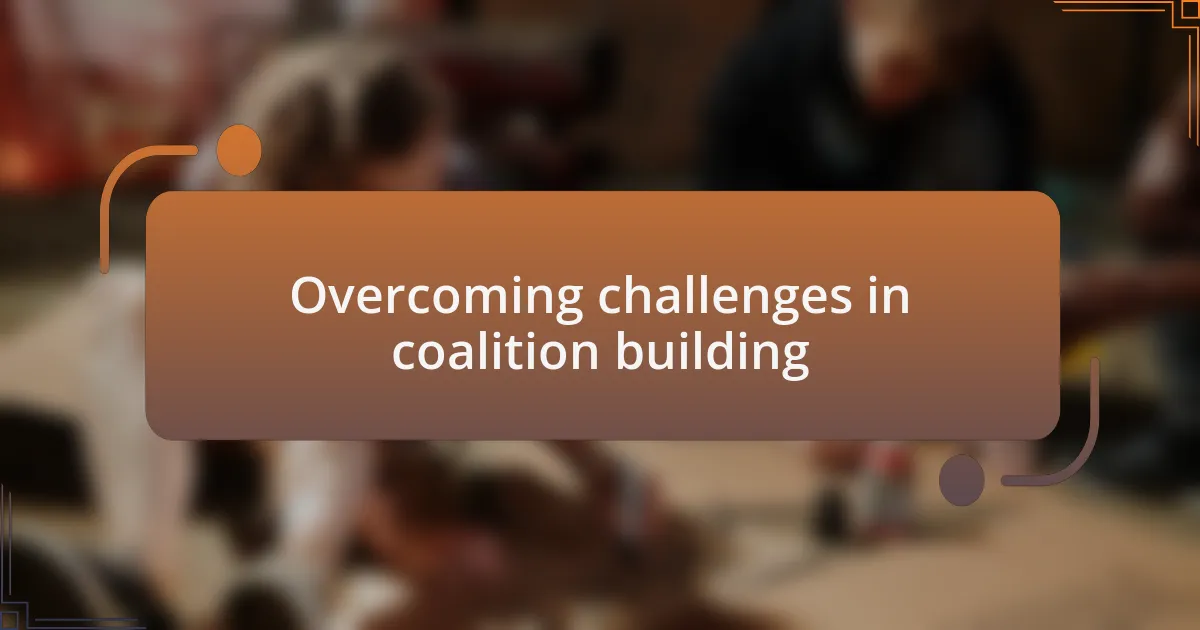
Overcoming challenges in coalition building
Building coalitions inevitably comes with challenges, particularly when addressing differing priorities among members. I recall a time when our group had to confront conflicting viewpoints on tactics. By actively listening and engaging in open dialogue, we found common ground that urged us to set aside our differences for the greater mission. Have you ever found yourself in a similar predicament, unsure of how to bridge the gaps? The key is creating an atmosphere of respect and understanding.
Another hurdle is sustaining motivation over time. In one coalition I was part of, energy levels dipped after several weeks of setbacks. We addressed this by holding regular check-ins to celebrate small victories, reaffirming our commitment to the cause. Those moments of recognition can reignite passion; how do you celebrate progress within your group? Acknowledging achievements fosters a sense of accomplishment that energizes everyone involved.
Additionally, incorporating diverse perspectives can pose its own set of difficulties. I recall participants hesitated to voice their opinions for fear of sparking conflict. To encourage openness, we implemented safe spaces where all ideas could be shared without judgment. This approach not only enhanced creativity but also built trust among members. How can you create an environment that embraces diverse voices in your coalition? It’s truly rewarding to witness growth when everyone feels heard and valued.
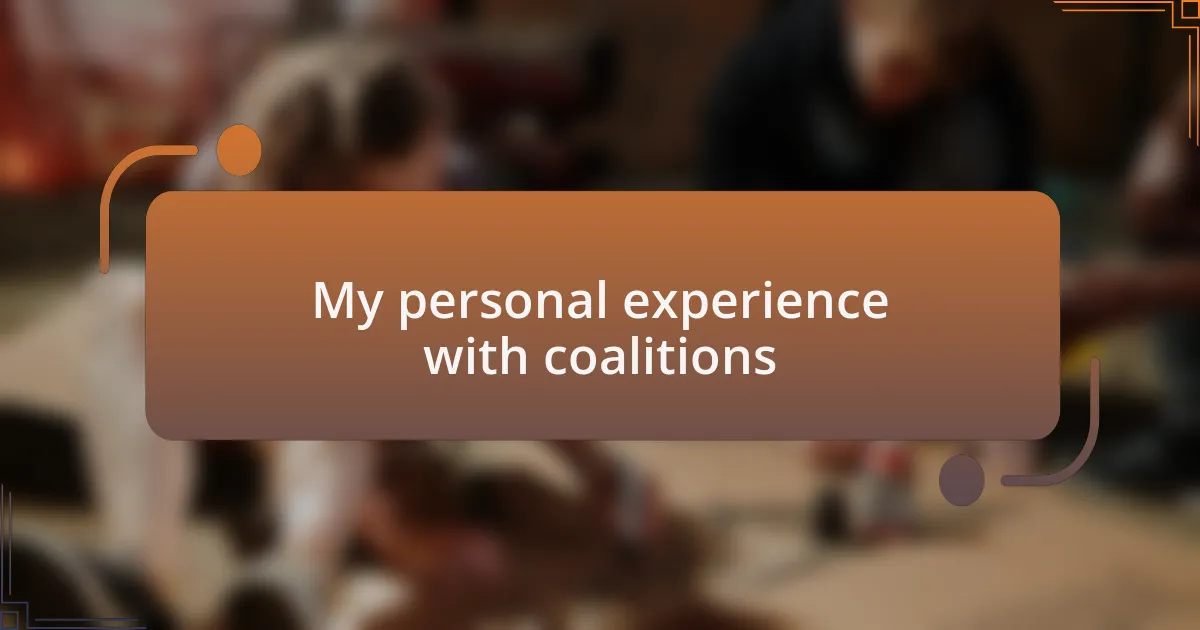
My personal experience with coalitions
In my journey with coalitions, I’ve encountered moments that really tested my resilience. For instance, during a particularly tough campaign, we faced intense pushback from external groups. Instead of retreating, we rallied together, drawing strength from each other’s stories and experiences. Has there ever been a moment when you felt empowered by those around you during adversity? I certainly did, and that shared determination was a driving force that kept us moving forward.
A few years back, I was involved in a coalition that aimed to unite various pro-life groups. Initially, it felt like herding cats; everyone had their own agenda. However, we held a weekend retreat that changed everything. We spent time getting to know one another personally, sharing our motivations and fears. I was amazed at how much vulnerability could unite us. How often do we take the time to truly understand our coalition partners? In that setting, I learned that personal connections are the bedrock of a successful coalition.
Finding the right balance between passion and pragmatism has been another key takeaway from my experiences. There was a time when our zeal led to impulsive decisions, causing unrest among members. I suggested developing a clear roadmap for our initiatives, which turned out to be crucial. It helped ground our discussions and provided everyone with a sense of direction. What strategies do you find helpful when navigating the fine line between enthusiasm and structured action? For me, that blend has been vital for fostering an environment where both passion and purpose can thrive.
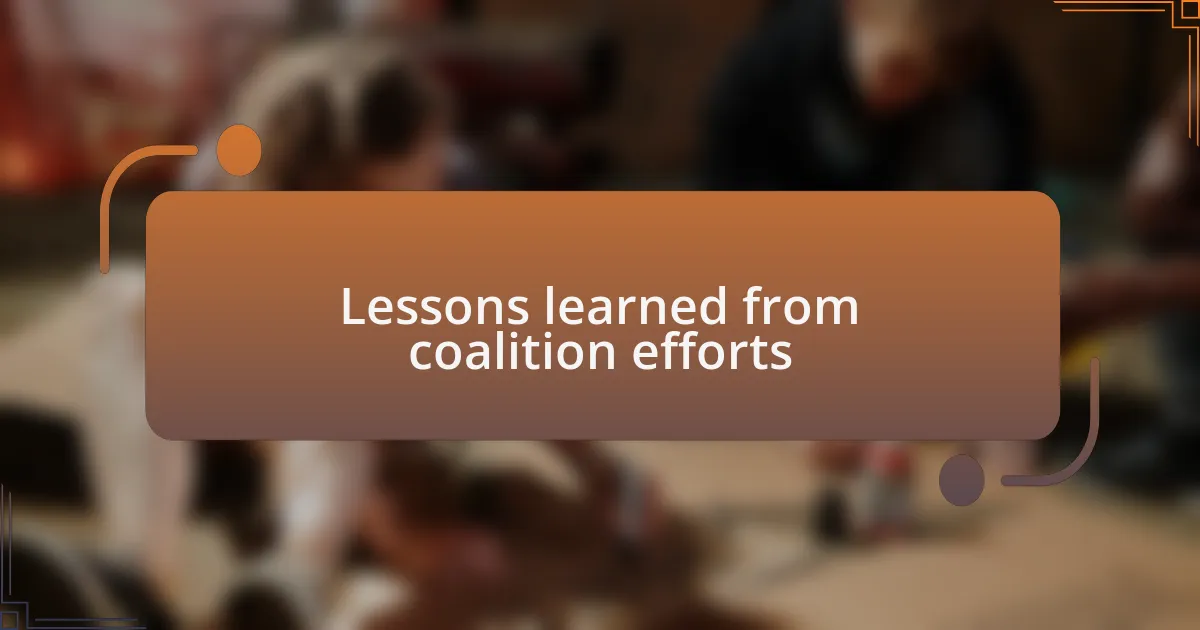
Lessons learned from coalition efforts
Reflecting on my coalition experiences, I learned that communication is vital. I remember a time when we were drafting a joint statement; assumptions crept in, causing confusion about our messaging. It became clear that without open dialogues and regular check-ins, we risked alienating supporters and diluting our message. Have you ever witnessed how a lack of clarity can hinder progress? I believe that fostering a culture of transparency can forge a stronger path forward.
One significant lesson from our coalition efforts was the importance of adaptability. During one initiative, our original plan went off course due to unexpected challenges. Instead of clinging to our initial strategy, we brainstormed solutions on the fly, which opened up new opportunities we hadn’t considered. How often do we get stuck in our ways? I realized that being flexible not only enhanced our effectiveness but also deepened our trust in one another.
Lastly, I discovered the power of small victories in maintaining morale. There was an occasion when an outreach event didn’t draw the crowd we expected, but we celebrated the few meaningful connections made. Those moments reminded us that progress is not always measured in numbers but in impact. Isn’t it refreshing to recognize that every effort counts? I found that by highlighting these small wins, we energized our coalition and reinforced our shared commitment to the cause.